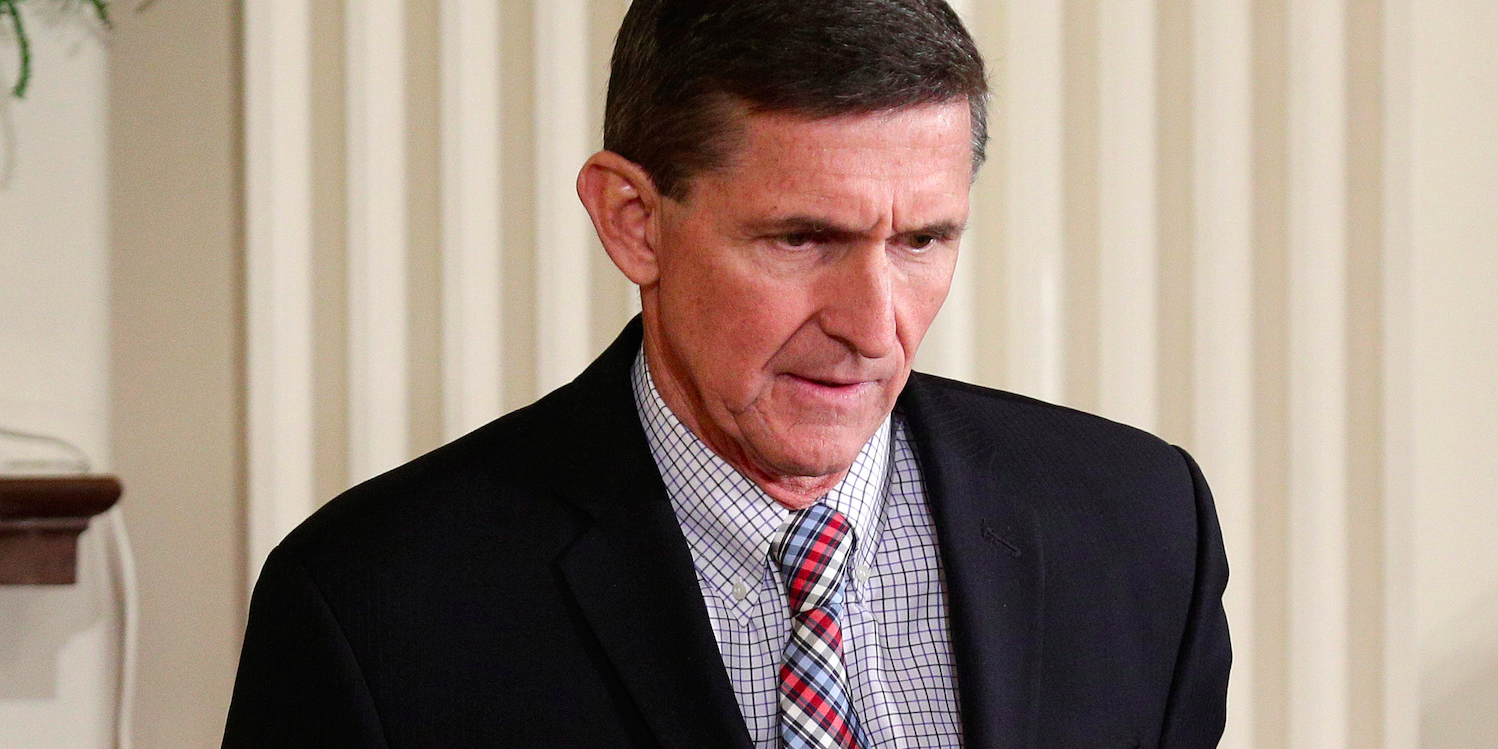- Robert Mueller is looking into former national security adviser Michael Flynn’s involvement in the production of a film about an exiled Turkish cleric.
- Flynn’s consulting firm was tasked with producing the film last year and reportedly did not want anyone to know of its involvement in the project.
- News of Mueller’s latest focus on Flynn comes on the heels of a Thursday New York Times report which indicated that Flynn’s team is negotiating or cooperating with Mueller’s team.
The special counsel, Robert Mueller, is examining former national security adviser Michael Flynn’s role in producing a documentary about an exiled Turkish cleric at the height of the 2016 presidential race, The Wall Street Journal reported Friday.
Mueller is eyeing Flynn as part of his investigation into Russia’s interference in the 2016 election and whether members of President Donald Trump’s campaign colluded with Moscow to tilt the race in his favor.
Flynn was forced to resign as national security adviser in February after it emerged that he had misled Vice President Mike Pence about his contacts with Russian officials during the transition period.
Mueller’s focus on Flynn has to do primarily with those interactions, as well as his lobbying firm’s activities and his failure to register as a foreign agent when the firm began lobbying on behalf of a businessman with ties to Turkish President Recep Tayyip Erdogan during the latter half of 2016.
Flynn's firm, Flynn Intel Group, was paid $530,000 in August 2016 by the businessman, Ekim Alptekin, who is also the head of the Dutch consulting firm Inovo.
Flynn Intel Group was tasked with fomenting dissent inside Turkey and with lobbying the US government to extradite the cleric, Fethullah Gulen, who currently resides in Pennsylvania and whom Erdogan believes is responsible for planning last year's attempted coup.
Flynn and his son, Michael Flynn Jr. - who is also a subject of scrutiny in Mueller's probe - are believed to have been offered $15 million to extradite Gulen, according to media reports. Flynn's lawyers said those reports were false, calling them "outrageous" and "prejudicial."
The documentary Alptekin paid Flynn Intel Group to produce was never completed, but it was meant to focus on the supposed dangers Gulen posed. Alptekin told The Journal in May that he hoped the documentary would be "a small, '60 Minutes' kind of a thing, where these conclusions are brought to the public."
"We thought that might have a good effect," he said.
'We don't want anyone to know the Flynn Intel Group has anything to do with this'
Flynn Intel Group did not want anyone to know about its involvement in the film's production, according to David Enders, a former VICE News correspondent who was hired to work on the documentary. He told The Journal that Bijan Kian, a partner at the now-defunct group, told him, "We don't want anyone to know the Flynn Intel Group has anything to do with this."
Sources familiar with the matter told The Journal on Friday that prosecutors have contacted Enders as well as former CNN anchor Rudi Bakhtiar, who was hired to work on the film, to question them about their involvement in the project.

Kian has also become a focus for Mueller, NBC News reported this week. The special counsel is seeking to gauge what role, if any, Kian played in securing the Inovo contract for Flynn Intel Group.
Prosecutors additionally want to know whether Kian has any information about other lobbying efforts the firm may have undertaken that have not yet been disclosed. They are also interested in a September 2016 meeting featuring Kian, Flynn, and the pro-Russia congressman Dana Rohrabacher, according to NBC News.
Flynn Intel Group was required, under the Foreign Agents Registration Act, to register as a foreign agent as soon as it secured the contract with Inovo, but it did not do so until months later. It acknowledged in a March filing - four months after it the contract with Alptekin ended - that its work could have "principally benefited" Turkey.
Friday's revelation about Mueller's focus on Flynn's lobbying work came on the heels of a New York Times report saying that Flynn's defense team has ceased sharing information about the Russia investigation with Trump's lawyers.
It's common for defense attorneys representing people under investigation to share information with each other about what they've gleaned from prosecutors, according to former federal prosecutor Renato Mariotti.
Usually, defense attorneys enter into a joint defense agreement, which entails that because each defense team's clients are on the same side, the attorneys' statements to each other are considered privileged information.
"The fact that Flynn's lawyers aren't sharing information with Trump's lawyers means that they believe it is no longer in Flynn's interest to do so," Mariotti wrote.
The development suggests that Flynn's attorneys are either cooperating with Mueller's team or that they are negotiating a plea deal, and that Flynn does not expect Trump to pardon him.

